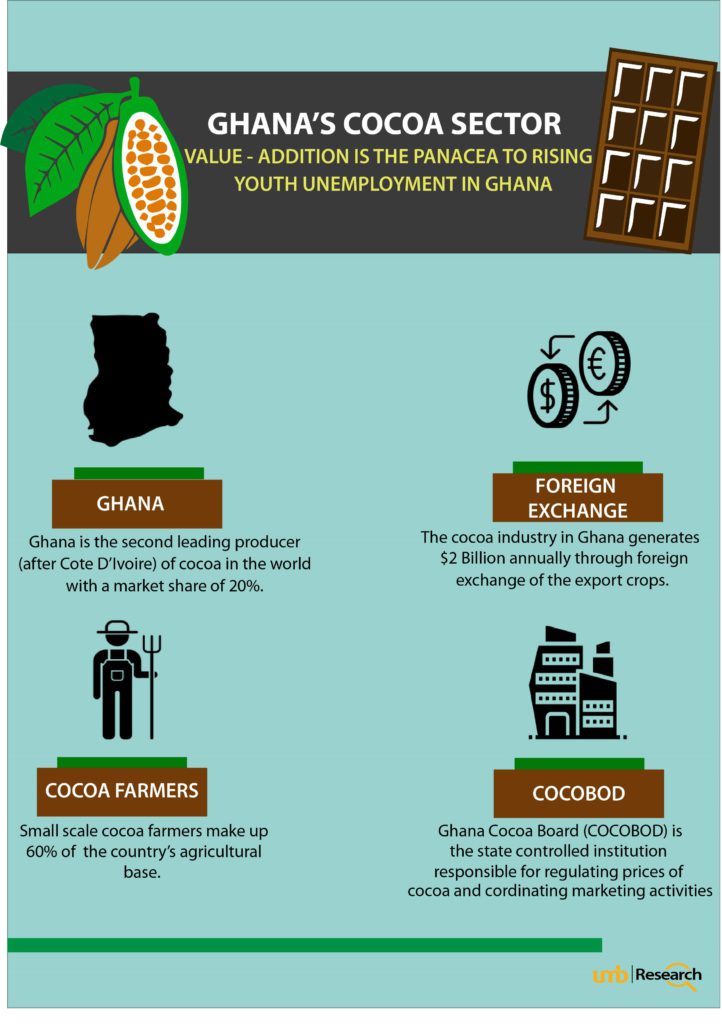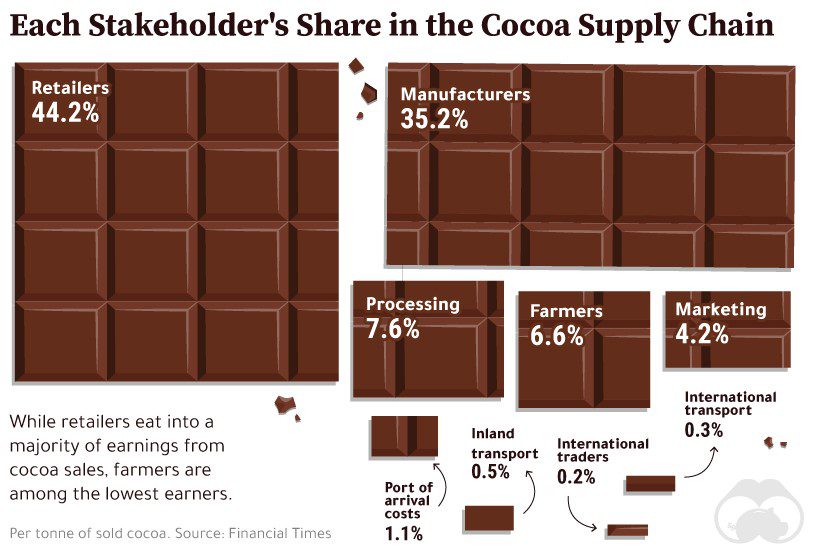A key item of discussion here in Ghana is on the question of youth unemployment. Ghana, like many sub -Saharan African countries is afflicted / or blessed with what is described as the youth bulge.
This means the majority of our growing populations are children and young adults.
Ordinarily, this bulge should bear a great dividend, as this segment is innately productive. However, many African countries seem unable to leverage this and are now afflicted with the woes of unemployment. This has charged discourse in Ghana over the last few years and this paper argues that the Cocoa Value Chain represents a viable answer to this.
Each step of the value chain creates jobs but our focus argues that Domestic Processing will move sustainable jobs from Europe to Africa. Furthermore, we argue that opportunities from the Africa Continental Free Trade Area (AFCFTA) definitely will deliver a larger single market with countless opportunities for the cocoa value chain, once harnessed. At this point, cocoa accounts for approximately 60% of the agricultural workforce at average daily wage of $1. If we scaled up the value addition, the economy would retain 20% more of the revenue leading to approximate 5.2% more entrants into the workforce*. (Based on extrapolation from www.odi.org )
For instance, at the recent cocoa awards, our bank representation chanced on a remarkedly simple but astounding innovation in cocoa. KOA Impact, an interesting industry has begun the successful production of fruit juice using an oft wasted part of cocoa- the pulp. Their delicious nectar has all the potential of sparking a similar value chain to the grape industry in Australia or California- since the scale for mass production already exists. Imagine the revenue wallet, if this juice was marketing to become the staple juice in the 300 million population in ECOWAS.

UMB as a Bank is clear about the potential for value -addition in Cocoa. Our Bank has focused on this industry since 1972 (the year UMB was established) and currently Banks 35% of all Local Buying Companies (LBCs). In the coming years, under the ambit of government policy, we aim to become the bank of choice to other players in this value chain. We recently, for example, led the way to structure a multi-million-dollar facility for an indigenous company, a key fertilizer player in this industry which lends credence to our continuous support to this sector.
In summary, we assert the argument. Theobroma (food for the gods) Cacao presents a fine opportunity to change the narrative on the ever-increasing youth unemployment with a focus on specific policy interventions. In that regard the COCOBOD aspiration of $50billion from cocoa by 2030 is the kind of exciting policy direction, in this regard. These policy interventions must focus on value-add at all levels of the value chain. This is perhaps best achieved through an execution plan following through on the next steps and setting key milestones on the COCOBOD 2030 @ $50billion aspiration.

On this note, on behalf of the leadership and colleagues at Universal Merchant Bank, we salute our gallant farmers and fishermen, especially in the COCOA SECTOR. Ayekoo on FARMERS DAY 2021 and may we amplify the heritage of Tetteh Quarshie with 1 million jobs and $50billion in revenue, by 2030.
This article was co-authored by:
Philemon Okyere Danquah
Philemon serves as General Manager -Corporate Banking at the Universal Merchant Bank (UMB). Philemon has over 2 decades of banking experience. His career has seen progressive growth in Wholesale Banking with significant stints at key finance houses. He currently leads the Corporate Banking unit at UMB. UMB is a leading Ghanaian bank with a particularly storied pedigree in Wholesale Banking. The Bank was established in 1972 and has significant domain strengths in agribusiness.
Stephen Ampadu
Stephen serves as the Head of Research and Business intelligence at the Universal Merchant Bank (UMB). Stephen is a thought-leader with significant expertise in economic and consumer research. He belongs to the emerging school in statistics that is committed to structuring statistical and economic analysis suited to the African experience and perspective. He currently leads UMB’s effort to provide data and analytics of the Ghanaian economy and other markets in ECOWAS for SME’s. Stephen drives UMB’s heritage of providing a uniquely Ghanaian perspective to market data, since 1972.
Latest Stories
-
Parkinson’s disease no longer confined to the elderly – Public Health Physician, Dr Momodou Cham warns
1 min -
Persons living with Parkinson’s disease appeal for support as they face stigmatization
15 mins -
36-year-old-trader sentenced for stealing employer’s money
18 mins -
9 signs you’re falling in love with someone who thoroughly enjoys emotional manipulation
25 mins -
Catholic Diocese of Keta Akatsi hosts Parkinson’s support group meeting
27 mins -
Wa Naa appeals to Akufo-Addo to audit state lands in Wa
50 mins -
5 secret ways people use ‘I love you’ as a form of manipulation
56 mins -
The most important question to ask yourself
1 hour -
Department of social welfare sensitises residents of Nabdam on child protection
1 hour -
Ghanaians must assess the quality of political leaders presented – Asah-Asante
1 hour -
Ashanti Regional Minister demands withdrawal of ‘fraudulent ECG bills’ sent to his residence
2 hours -
Delta Air Lines deploys new Airbus on Accra-New York route
2 hours -
PPDC spearheads Africa’s AI development at DRIF24 forum
2 hours -
Ripoti App launched to empower journalists, others to tackle digital rights violations in Africa
2 hours -
Ground-breaking health investment charter to tackle worker shortages in Africa
2 hours

